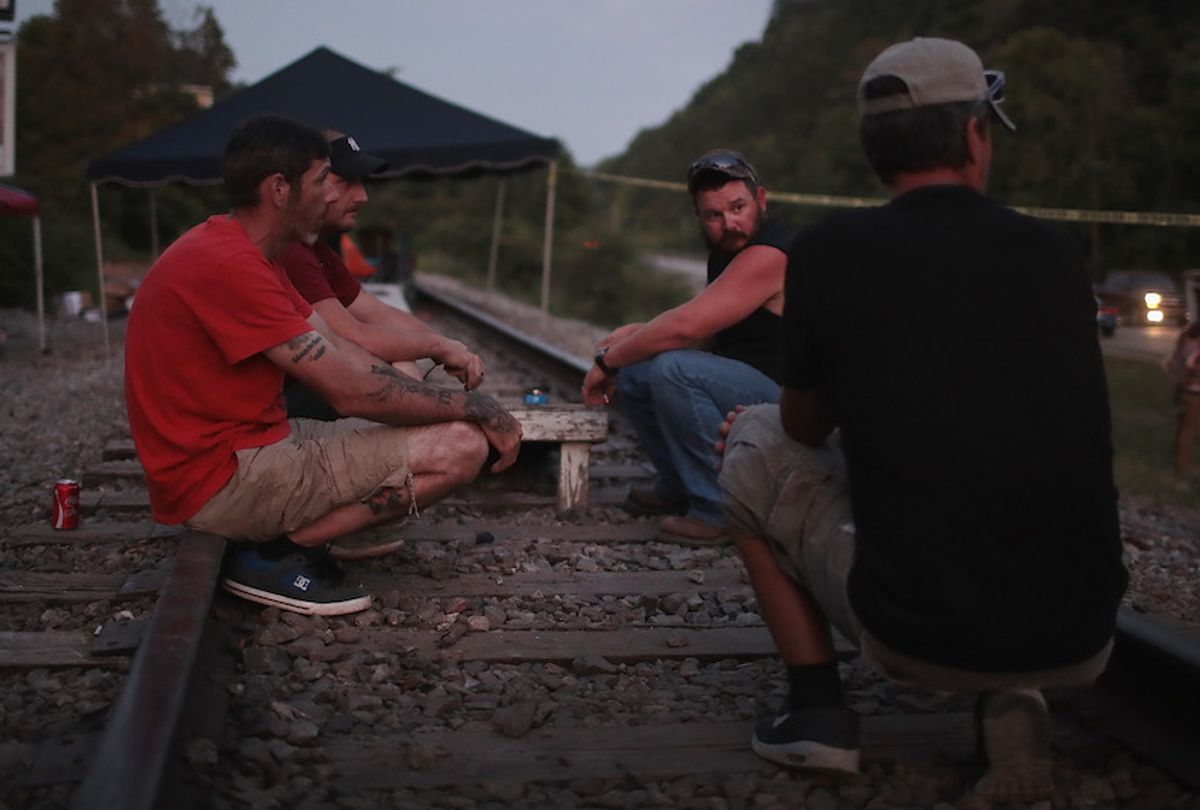Progressives on Friday highlighted the power of direct action following a series of federal court settlements this week that will provide coal miners who blocked train tracks in Kentucky for nearly two months this summer to protest against unpaid wages from their bankrupt employer, Blackjewel LLC, with over $5 million in back pay.
Congratulating the laid off coal miners on their victory, longtime labor advocate and 2020 Democratic presidential candidate Sen. Bernie Sanders (I-Vt) tweeted Friday, "When workers stand together, fight back, and demand an end to corporate greed—they win."
In August, Sanders sent 18 pizzas to the protesters and, while visiting Kentucky, called out Republican Senate Majority Leader Mitch McConnell for ignoring the laid off workers. McConnnell has represented Kentucky in the Senate since 1985.
Sanders' tweet Friday came in response to Washington Post journalist Jeff Stein, who commented, "Wow, talk about direct action getting results," and shared a report about the court settlements.
According to The Associated Press:
Agreements filed in U.S. District Court this week will pay out nearly $5.5 million in back pay to miners from Blackjewel LLC's eastern mines. The checks from over the summer bounced when workers tried to cash them, prompting several miners in Kentucky to protest by blocking coal shipments in Harlan County.
The agreement involves a separate entity, Blackjewel Marketing and Sales Holdings, paying the bankrupt company $5.47 million to issue paychecks to employees, the Bristol Herald Courier reported. Blackjewel owned mines in Kentucky, West Virginia, Wyoming, and Virginia.
Blackjewel attorney Stephen Lerner told the Bristol Herald Courier by email Wednesday that "payroll checks are expected to be issued this week" to cover workers' unpaid wages from June 10 and July 1, when the company filed for Chapter 11 bankruptcy protection.
While laid off miners physically blocked tracks, the AP noted that the U.S. Department of Labor "had taken steps to prevent Blackjewel from moving thousands of tons of coal. The department alleged the coal violated the Fair Labor Standards Act, which prohibits the transportation of goods if the workers who produced them had not been paid."
Ned Pillersdorf, a Kentucky attorney representing some of the miners, said Thursday that "when wage earners are trespassing and blocking tracks, the government usually comes in against them... And here the government came in with guns blazing in favor of my clients, and it took a while but I'm really appreciative of all they did to help my guys."
Jeffrey Willig, a 40-year-old miner who helped start the protest in Kentucky, told The New York Timesthat he was surprised the train blockade garneredmedia attention and support from across the globe.
"We were trying to get our point across: You delay our pay, we'll delay your train," he explained. "We just thought we were going to be five guys blocking a train—it was going to be local news and that was it."
Willig added that he is "really happy" about the settlements. "It's the whole reason we took our stand," he said. "We just wanted the money that we worked for."
Former Blackjewel miner Collin Cornette had a similar reaction, telling the AP that "I feel relieved to finally be getting the pay that I worked for, which is what all of us miners wanted."
"The protest made people realize that working Americans—when united—can be a powerful force," said the 41-year-old Cornette, who is leaving the mining industry to



Shares